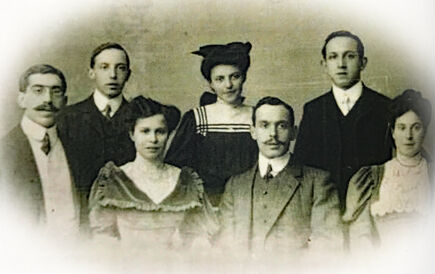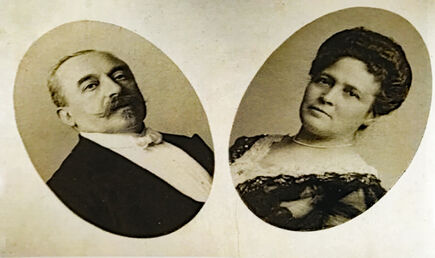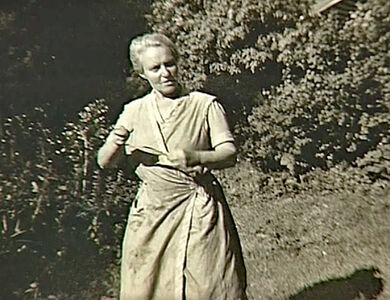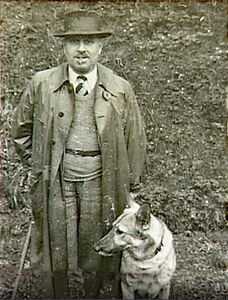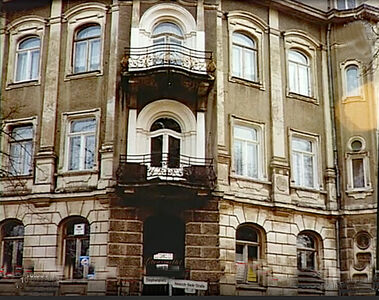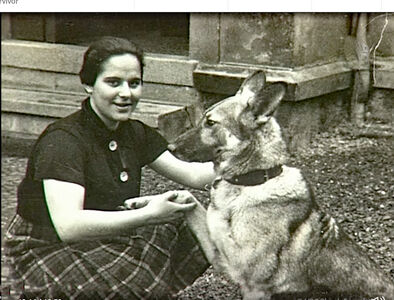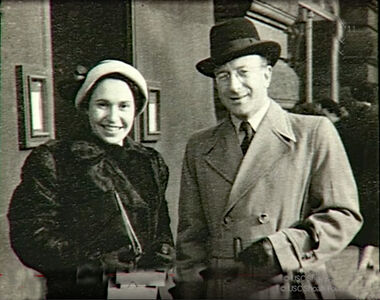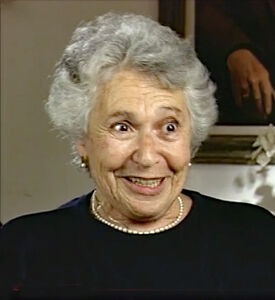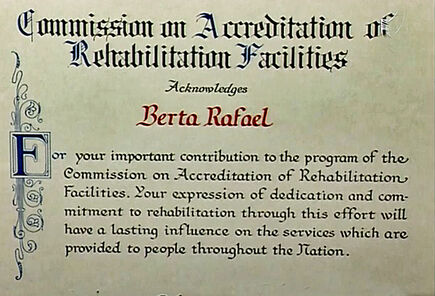personal data
Lippmann Frieda
Parents: Felix Ehrlich and Clara Ehrlich née Oppenheim
Siblings: Ludwig, Else m. Michelsohn, Franz, Paul, Martha m. Aufrichtig, Gustav
Spouse: Georg Lippmann
Children: Traudel (Trudi) and Bertel (Bertha)
Ludwigstraße 10 (today's count)
During Nazi-era emigrated to England
biography
Frieda (Friedel) Lippmann, née Ehrlich came from a long-established Jewish traders’ family in Bad Kissingen. Her grandfather Samuel Ehrlich had received a license for trading with cloths and later opened a textile business in Obere Marktstrasse. His son Felix extended the family business and got the award “Royal Bavarian Purveyor to the Court”. Since 1887, he ran a flourishing fashion shop at the corner of Ludwigstrasse and Kurhausstrasse. After his marriage to Clara Oppenheim on November 7, 1892, Frieda Ehrlich was born as the youngest child.
Frieda Ehrlich moved to Chemnitz with her husband Georg Lippmann. She must have lived in Chemnitz before 1914 and visited her parents in Bad Kissingen several times during World War I. Her daughter Bertha was born in Würzburg on July 4, 1917. Her nephew Josef Ehrlich (Joske Ereli) tells in his autobiography that Frieda's husband, who was a travelling salesman and often travelling around, was the only one of the Ehrlich relatives who owned a car of the firm “Wanderer” (See: J. Ereli, p. 43). The Lippmanns travelled extensively in it, including on winter holidays in Switzerland or Austria, where the children learnt to ski. At first they had their own chauffeur, but soon Georg Lippmann, who was obviously a passionate driver, was driving his "Wanderer" himself. Once or twice a year, they also travelled to Bad Kissingen to visit the Ehrlich family.
The Lippmann family was a wealthy family and could afford a stately home (see photo album), as Frieda's husband had a company that sold iron beams for buildings and railway tracks and was quite successful, and until the National Socialists came to power, nothing clouded the family's happiness. In an interview with the Shoa Foundation in 1996, Frieda's daughter Berta described in retrospect how happy her childhood was with her loving parents. The upbringing at home was not very religious, there was no kosher cuisine. On the high holidays, they attended the synagogue in the immediate vicinity of their home, but less for religious reasons and more out of respect for the Lippmann grandparents, as her grandfather had contributed to the construction of the new synagogue (see USC Shoa Foundation, interview with Berta Rafael, 1996)![]() .
.
When the National Socialists came to power in 1933, the situation changed abruptly for the family. The Reichsbahn declared that it would no longer purchase goods from a Jewish businessman. As a result, the company was taken over by a non-Jewish authorised signatory. After the war, he apologised to Georg Lippmann for his behaviour and paid him high compensation. As early as 1934, Frieda and her husband sent their older daughter Berta, who was frightened by the increasing anti-Semitism in Germany, to England for two years for further education. She was placed there with "Uncle Ludi" in London, a wealthy uncle of Frieda's, who enabled forty other members of the Ehrlich family to emigrate to England over the next few years and sponsored them.
Even during these difficult years, Frieda and her husband never lost their confidence. Berta describes her parents as "happy, optimistic people who never complained or said 'everything was better when we were younger'. They just went with the flow, which I really admired" (ibid.).
Georg Lippmann found work as a businessman in an English glove factory owned by a good friend, so that the family's livelihood was ensured over the next few years. Frieda, her husband and their youngest daughter continued to live in Chemnitz until the situation came to a head in autumn 1938. In November 1938, Frieda and Georg were celebrating their silver wedding anniversary in Berlin when the pogrom broke out. Georg Lippmann hid for a week to avoid being arrested. Whenever the doorbell rang, he crawled into the trunk of his car. After a week, when an acquaintance at the police station in Chemnitz signalled to him that the situation there had eased, he returned to Chemnitz for a short time, but left Germany at the end of 1938 and emigrated to England. "Uncle Ludi" had also given a guarantee to the British authorities on their behalf.
Frieda initially stayed in Chemnitz, took care of everything that was necessary to leave the country and paid the Reich flight tax in order to obtain the documents required to leave the country. In August 1939, shortly before the start of the war, she also managed to make the crossing to England, so that the whole family was safe (ibid.).
Frieda and Georg found refuge in the country estate of Friedel’s uncle Ludwig (Onkel Ludi) in Bexley (See: JK. Ereli, p. 68). In the economically difficult early days in England after the war, Frieda's husband Georg had to earn a living for the family as a factory labourer. (The London Gazette, 16.01.1948).
Their two daughters Berta (1917 - 2005) and Traudel, who now called herself Trude (1920 - 2019), emigrated to the USA after the war and lived long and fulfilling lives. Berta Rafael, who worked for many years as the director of institutions for disabled children and developed therapy programmes, gave a remarkable interview to the Shoa Foundation in 1996, in which she also paints a vivid picture of her parents. She radiates joy of life and vigour, qualities that she also admired in her mother Frieda and father Georg.
Frieda Lippmann died in England in 1969 at the age of 66; according to her daughter Berta, her husband Georg died in 1968.
From the photo album:
References
Hans-Jürgen Beck, Kissingen war unsere Heimat, Stand April 2017, S.579
Joske Ereli: Von Hampi Ehrlich zu Jossl Ereli - Meine Lebensgeschichte
USC Shoa Foundation, Interview mit Berta Rafael, 1996![]()
The London Gazette, 16.01.1948, S. 425![]()
Meldeunterlagen Stadt Bad Kissingen
Meldeunterlagen der Stadt Chemnitz, Mail von Dr. Pfalzer vom 10.09.2018
Photo credits
© Joske Ereli, Ein Gedi und Berta Rafael geb. Lippmann)
Back
